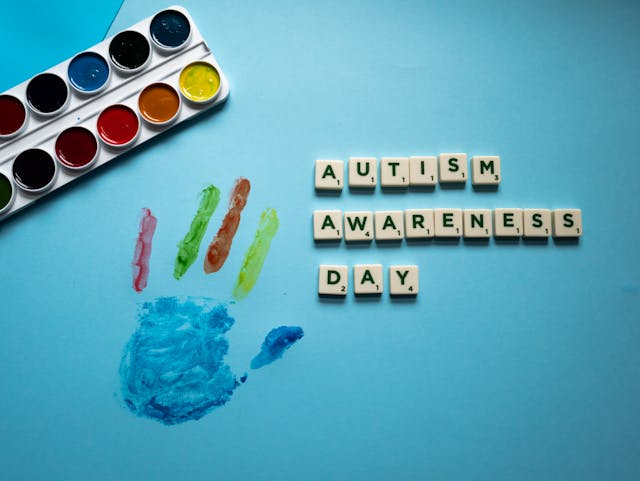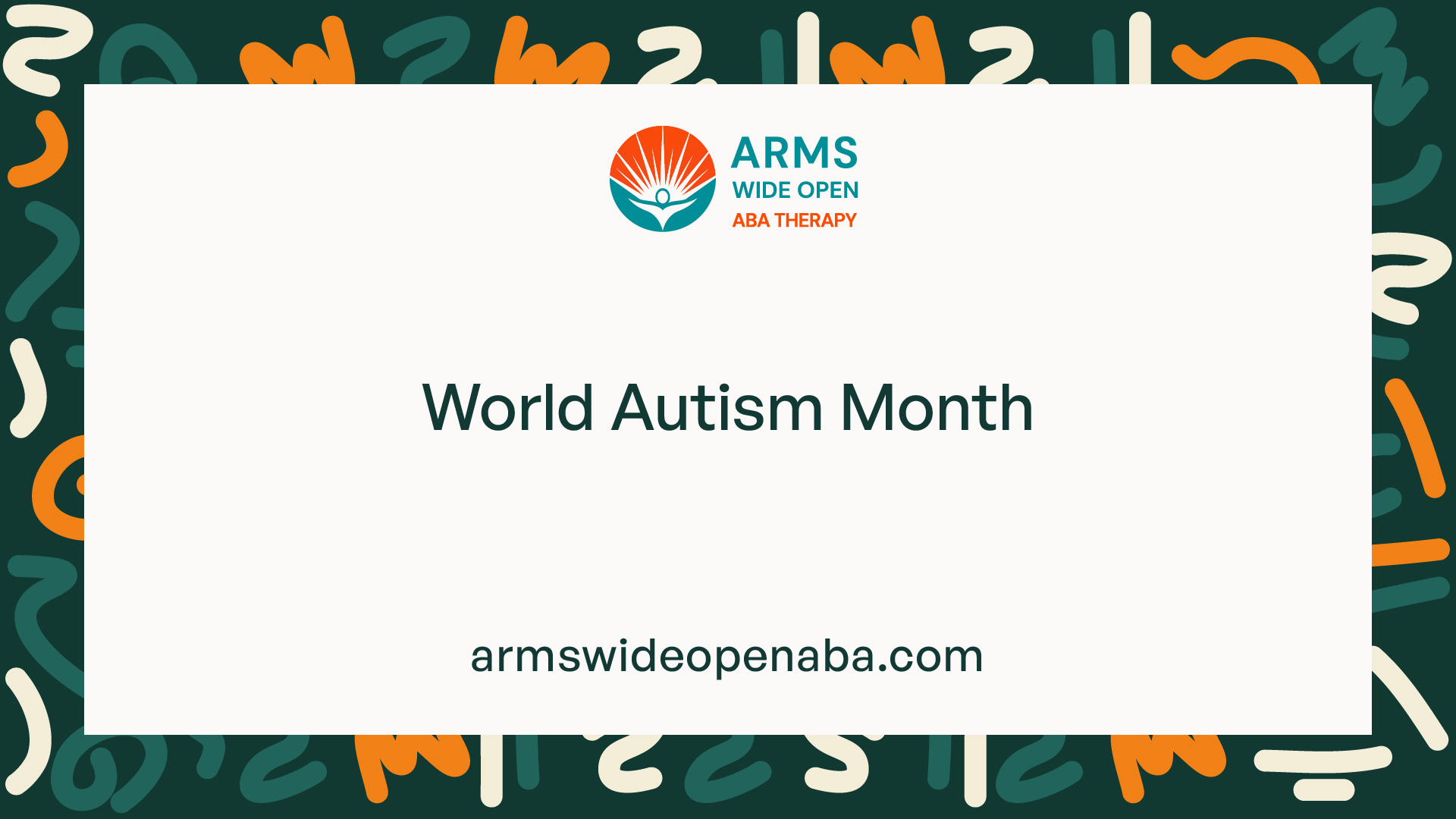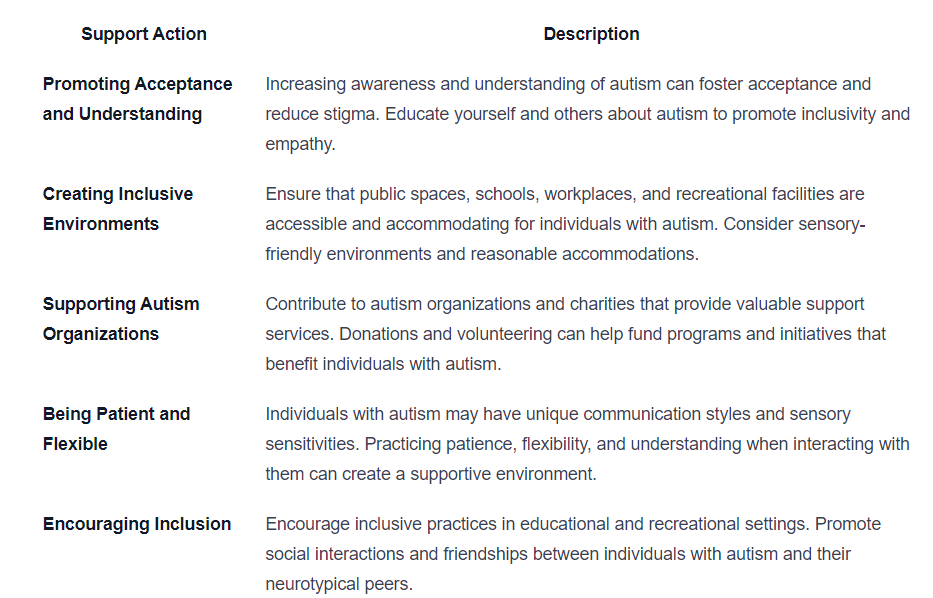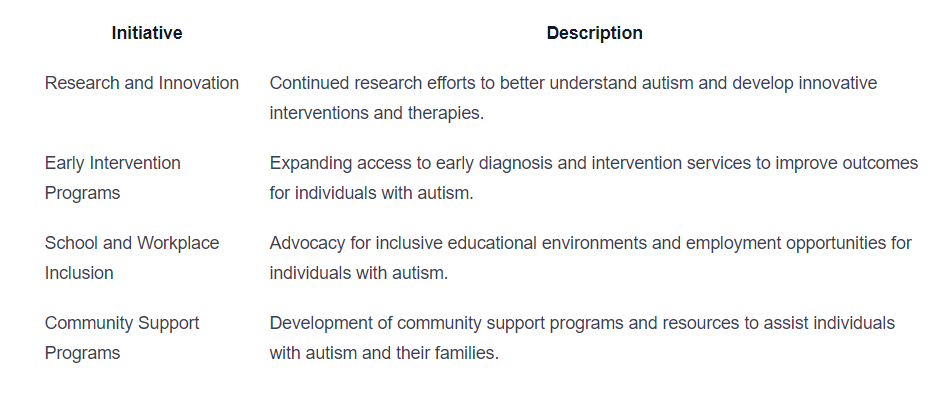World Autism Month
Join the global movement during World Autism Month. Discover the significance, awareness efforts, and support for individuals with autism.

Understanding Autism
Autism is a neurodevelopmental disorder that affects individuals' social interaction, communication, and behavior. It is characterized by a wide range of symptoms and challenges, making each person's experience unique. Understanding autism is essential for promoting inclusion and support for individuals with autism.

What is Autism?
Autism, also known as Autism Spectrum Disorder (ASD), is a condition that impacts the way a person perceives and interacts with the world around them. It affects individuals across their lifespan and can manifest in various ways. Some common characteristics of autism include:
- Difficulties in social interactions: Individuals with autism may struggle with understanding and responding to social cues, making it challenging for them to initiate and maintain relationships.
- Communication differences: People with autism may have difficulties with verbal and nonverbal communication. They may have delays in speech development or use repetitive language patterns.
- Restricted and repetitive behaviors: Individuals with autism often engage in repetitive behaviors or have specific interests. They may exhibit rigid adherence to routines and experience distress with changes in their environment.
- Sensory sensitivities: Many individuals with autism have heightened sensitivity to sensory stimuli, such as sound, light, touch, or taste. This sensitivity can significantly impact their daily experiences.
It's important to note that autism is a spectrum disorder, meaning that individuals can have varying degrees of impairment and strengths. Each person with autism has unique abilities, challenges, and perspectives.
Prevalence of Autism
Autism is a global issue, affecting people of all racial, ethnic, and socioeconomic backgrounds. The prevalence of autism has been steadily increasing over the years, with improved awareness and diagnostic practices contributing to higher identification rates.
According to the latest statistics from the Centers for Disease Control and Prevention (CDC), approximately 1 in 54 children in the United States is diagnosed with autism. This prevalence indicates that autism is a relatively common developmental disorder that impacts a significant number of individuals and families.
The global prevalence of autism varies across different regions and countries. However, data from various studies suggest that autism affects around 1-2% of the population worldwide. These numbers highlight the importance of understanding and supporting individuals with autism to ensure inclusive communities and access to appropriate resources.
By increasing awareness and understanding of autism, we can promote acceptance, support, and opportunities for individuals on the autism spectrum. World Autism Month plays a crucial role in bringing attention to this disorder and fostering a more inclusive and accepting society.
World Autism Month
World Autism Month holds great significance in raising awareness and promoting understanding about autism spectrum disorder (ASD). This global initiative, observed every April, aims to foster acceptance, support, and inclusion for individuals with autism and their families. Let's explore the significance of World Autism Month and its history and evolution.
Significance of World Autism Month
World Autism Month serves as a platform to shed light on the challenges faced by individuals with autism and the need for acceptance and inclusion in society. It provides an opportunity to educate communities about autism, dispel myths and misconceptions, and encourage empathy and understanding.
During this month, various activities, events, and campaigns are organized worldwide to raise awareness about autism and promote acceptance. These efforts help in breaking down barriers, fostering a supportive environment, and ensuring that individuals with autism have equal opportunities to thrive and reach their full potential.
History and Evolution of World Autism Month
The history of World Autism Month can be traced back to the establishment of Autism Awareness Day on April 2nd, 2008, by the United Nations General Assembly. This day was designated to highlight the need for increased awareness and understanding of autism globally.
Over time, Autism Awareness Day evolved into a month-long observance, known as World Autism Month. This expansion allowed for a more extensive focus on education, advocacy, and support throughout April. The month provides an opportunity for individuals, organizations, and communities to come together, share knowledge, and promote positive change.
Since its inception, World Autism Month has gained momentum and recognition worldwide. It has become a crucial platform for promoting acceptance, fostering inclusivity, and advocating for the rights and well-being of individuals on the autism spectrum.
As World Autism Month continues to evolve, it plays a vital role in creating a more inclusive society that embraces and supports individuals with autism. Through ongoing efforts and collective action, we can work towards a world where individuals with autism are valued, understood, and able to participate fully in all aspects of life.
Awareness and Advocacy
Raising awareness for autism is a vital aspect of promoting understanding and acceptance of individuals on the autism spectrum. World Autism Month, observed in April, serves as a significant platform for increasing awareness and advocating for the needs and rights of individuals with autism.
Raising Awareness for Autism
During World Autism Month, various initiatives and activities are organized to raise public awareness about autism. The primary goal is to educate individuals about the characteristics and challenges faced by people on the autism spectrum. By increasing awareness, society can develop a better understanding of autism and create a more inclusive and supportive environment.
To effectively raise awareness, organizations and advocacy groups often utilize different mediums and strategies. These may include:
- Social media campaigns: Organizations leverage social media platforms to share information, personal stories, and resources related to autism. This helps to reach a broader audience and engage with individuals worldwide.
- Public events and seminars: Workshops, conferences, and seminars are organized to provide accurate information about autism to professionals, educators, and the general public. These events often feature experts in the field who share their knowledge and experiences.
- Educational materials: Brochures, pamphlets, and online resources are developed to provide concise and accessible information about autism. These materials help dispel myths and misconceptions, fostering a more accurate understanding of the condition.
- Media coverage: Television programs, news articles, and interviews with individuals on the autism spectrum and their families help to highlight the unique perspectives and challenges faced by the autism community. This type of media coverage plays a crucial role in increasing public knowledge and empathy.
Advocacy Efforts during World Autism Month
World Autism Month also serves as an opportunity for advocacy efforts that aim to improve the lives of individuals with autism. Advocacy involves actively supporting and promoting the rights, needs, and well-being of individuals on the autism spectrum.
Advocacy efforts during World Autism Month may include:
- Legislative advocacy: Organizations and individuals may lobby for policy changes at local, national, and international levels. These efforts aim to ensure that individuals with autism have equal access to education, healthcare, employment opportunities, and other essential services.
- Community outreach: Advocacy groups work to engage with local communities, businesses, and schools to promote understanding and inclusion. They may organize events, workshops, and training sessions to educate the community about autism and encourage acceptance.
- Support for families: Advocacy organizations often provide support services and resources for families of individuals with autism. This includes guidance on navigating educational systems, accessing therapies, and connecting with support networks.
- Collaboration and partnerships: Advocacy groups collaborate with other organizations, both within and outside the autism community, to amplify their impact. By working together, they can advocate for systemic changes and promote the rights and well-being of individuals with autism more effectively.
Through raising awareness and advocating for the needs of individuals with autism, World Autism Month plays a crucial role in fostering a more inclusive and understanding society. By embracing the unique strengths and challenges of individuals on the autism spectrum, we can create a world that celebrates neurodiversity and provides equal opportunities for all.
Supporting Individuals with Autism
Providing support services for individuals with autism is crucial for their well-being and development. World Autism Month serves as a reminder of the importance of creating a supportive environment and promoting inclusivity. Here, we will explore the significance of support services for individuals with autism and discuss various ways to offer support.
Importance of Support Services
Support services play a vital role in addressing the unique needs of individuals with autism. These services aim to enhance their quality of life, promote independence, and facilitate their inclusion in various aspects of society. By providing appropriate support, individuals with autism can thrive and reach their full potential.
Support services for individuals with autism can encompass a wide range of areas, including education, healthcare, therapy, and community engagement. Some key aspects of support services include:
- Education: Access to quality education is essential for individuals with autism. Special education programs tailored to their specific learning needs can help them acquire knowledge and develop essential skills.
- Therapy: Various types of therapy, such as speech therapy, occupational therapy, and behavior therapy, can significantly benefit individuals with autism. These therapies focus on improving communication, social skills, and overall well-being.
- Healthcare: Individuals with autism may require specialized healthcare services to address their unique needs. Healthcare providers who are knowledgeable about autism can provide appropriate medical care and support.
- Community Support: Building a supportive community is crucial for individuals with autism and their families. Community organizations, support groups, and inclusive recreational programs can create a sense of belonging and provide opportunities for social interaction.
Ways to Support Individuals with Autism
There are several ways in which individuals and communities can support individuals with autism. These actions can make a positive impact and help create a more inclusive society. Here are some examples:

By prioritizing support services and taking these actions, we can create a more inclusive society that embraces and supports individuals with autism. World Autism Month serves as a reminder to continue advocating for the rights, well-being, and inclusion of individuals with autism, not just during this month but throughout the year.
Celebrating Differences
In the spirit of World Autism Month, it is important to celebrate the uniqueness and diversity of individuals on the autism spectrum. This section focuses on two key aspects of celebrating differences: embracing neurodiversity and highlighting success stories.
Embracing Neurodiversity
Embracing neurodiversity means recognizing and valuing the wide range of neurological differences in individuals, including those with autism. Instead of viewing autism as a disorder or a deficit, it emphasizes the idea that neurological differences are simply variations of the human brain.
By embracing neurodiversity, we promote inclusivity and acceptance of individuals with autism. It encourages society to shift from a mindset of trying to "cure" or "fix" autism to one that accepts and accommodates the unique strengths and challenges of individuals on the spectrum. Embracing neurodiversity fosters a more inclusive and supportive environment for individuals with autism to thrive.
Highlighting Success Stories
Highlighting success stories during World Autism Month is a powerful way to showcase the achievements and capabilities of individuals on the autism spectrum. These stories serve as inspiration and provide hope to individuals with autism and their families, while also raising awareness and promoting a greater understanding of autism within the community.
Success stories can feature individuals who have overcome challenges, achieved personal milestones, or made significant contributions in various fields. These stories help challenge stereotypes and misconceptions about autism, demonstrating that individuals on the spectrum have unique talents, skills, and perspectives to offer.
It's important to remember that success stories are diverse and can vary greatly from person to person. Some individuals with autism may excel academically, while others may demonstrate remarkable artistic or musical abilities. By highlighting a range of success stories, we can break down barriers, change perceptions, and encourage society to appreciate the strengths and abilities of individuals with autism.
Celebrating the differences of individuals on the autism spectrum through embracing neurodiversity and highlighting success stories not only fosters a more inclusive society but also creates a platform for greater understanding and acceptance. By recognizing and valuing the contributions and achievements of individuals with autism, we can collectively work towards a world that embraces diversity and provides equal opportunities for all.
Moving Forward
As World Autism Month comes to a close, the focus on autism awareness and acceptance continues beyond the designated month. Efforts to raise awareness and promote inclusion for individuals with autism are ongoing. Looking ahead, there are future initiatives and a continued fight for inclusion and acceptance.
Future Initiatives for Autism Awareness
Moving forward, there are several future initiatives in place to further increase autism awareness. These initiatives aim to educate the public, promote understanding, and reduce the stigma surrounding autism. Some of these initiatives include:

By implementing these initiatives, it is hoped that society will become more inclusive and supportive of individuals with autism, enabling them to reach their full potential.
The Continued Fight for Inclusion and Acceptance
While progress has been made in raising autism awareness, the fight for inclusion and acceptance continues. It is essential to advocate for the rights and needs of individuals with autism in all aspects of life, including education, employment, healthcare, and social interactions.
Inclusion involves creating a society where individuals with autism are fully embraced and provided with equal opportunities. This includes fostering inclusive educational environments, ensuring reasonable accommodations in the workplace, and promoting accessible healthcare services. Society as a whole plays a crucial role in creating an inclusive environment that values and respects the unique abilities and perspectives of individuals with autism.
Advocacy groups, nonprofits, and individuals are actively working together to promote acceptance and create a more inclusive society. By challenging stereotypes, promoting understanding, and embracing neurodiversity, we can build a world where individuals with autism are valued, supported, and celebrated for their strengths and contributions.
As we move forward, let us continue to support autism awareness, advocate for inclusion, and work towards a society that embraces and accepts individuals with autism for who they are. Together, we can create a more inclusive and accepting world for all.
Sources
https://www.autismspeaks.org/world-autism-month
https://www.autismspeaks.org/world-autism-month-faq
Similar articles
We’re here to help you

Our team is here to assist you in this process. Contact us for any assistance.
it’s easy to apply
We Accept Most Insurances
Our in-network insurance partnerships make ABA therapy more accessible to families throughout our service areas.







Our Insurance Process
We'll request your insurance details to help us verify your plan's coverage for ABA therapy. Once we've received this information, we'll walk you through your benefits, including copayments, deductibles and out-of-pocket maximums, so you know what to expect in advance.
Our team will then handle the preauthorization and all the necessary paperwork.
.svg)





















.jpeg)


































.jpeg)




.jpeg)







.jpeg)











.jpeg)
















